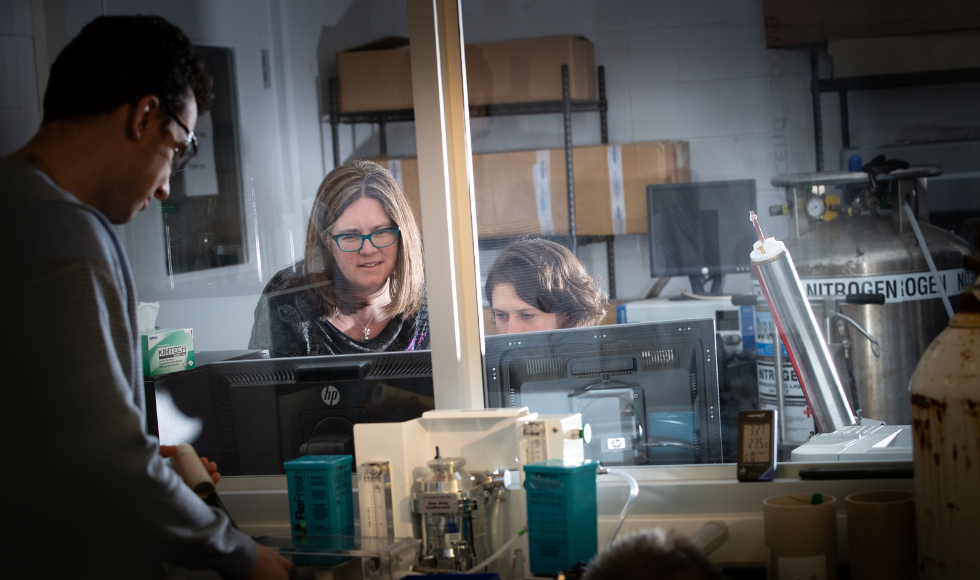McMaster receives over $4.2M to lead critical minerals research

Gillian Goward, centre, a professor of chemistry and chemical biology, is one of five McMaster researchers to receive funding from NSERC to advance cutting-edge research on critical minerals like zinc, copper and lithium.
BY Daniella Fiorentino, Office of the VP Research
May 28, 2024
Five researchers from the faculties of Engineering and Science have been awarded over $4.2M to advance critical minerals research in collaboration with industry leaders.
The funding is through the Natural Sciences and Engineering Research Council of Canada’s (NSERC) Alliance Missions: Critical Minerals Research grant.
Launched in 2023, the grant aims to support interdisciplinary research that strengthens Canada’s position as a leading supplier of critical minerals, which are central to major global industries such as clean technology, auto manufacturing, health care, aerospace and the digital economy.
McMaster’s recipients of the three-year grants are:
- Gillian Goward, Faculty of Science | $1,100,000
Assessing the Circular Economy for Endangered Elements Needed in Lithium-Ion Batteries: Advanced Characterization of Recycled Materials and LIB Performance - Drew Higgins, Faculty of Engineering | $633,000
Recovery of zinc and manganese dioxide from spent rechargeable zinc-ion batteries and reuse in freshly prepared electrodes - Marek Niewczas, Faculty of Engineering | $645,320
Development of High Strength, High Electrical Conductivity Aluminum Alloys for the Replacement of Copper in Electrical Applications - Nana Ofori-Opoku, Faculty of Engineering | $ 1,477,450
Sustainable Critical Mineral Recovery: Advancing CO2 Sequestration and Mineral Extraction - Robin Zhao, Faculty of Engineering | $379,970
Optimizing subsurface mining technologies for sustainable lithium production from brines
The McMaster projects cover a variety of research areas related to the extraction and use of critical minerals, such as recycling minerals from spent batteries, developing new aluminum alloys for use in automotive and electronic industries, and advancing sustainable lithium mining methods.
Researchers will collaborate with leading organizations in energy, technology and materials from across Canada, including E3 Lithium, Salient Energy, Li-Cycle and Natural Resources Canada’s CanmetMATERIALS.
Nana Ofori-Opoku, an assistant professor in the department of materials science and engineering, is collaborating with Rockburst Technologies Inc. to develop a sustainable minerals extraction solution.
The partners will assess the feasibility, environmental impact, economic factors, technological advancements, and commercial readiness of the company’s energy-efficient rock pulverization technique that aims to significantly reduce the energy consumed and greenhouse gases emitted during rock breakage in mining.
“Critical minerals like lithium, nickel, and platinum group elements form the backbone of modern technologies, but it is often challenging to extract these minerals from complex deposits,” says Ofori-Opoku.
“Rockburst Technologies’ technique uses CO2 gas to break rock from within — a more energy-efficient method than traditional energy-intensive compression techniques.”
“I’m looking forward to collaborating with them to advance this technology while promoting sustainable mining practices that will not only support Canada’s future as a global supplier of critical minerals, but also address pressing climate challenges.”
The funding will help researchers develop sustainable minerals solutions that support Canadian industry, the economy and the environment, says Andy Knights, acting vice-president, Research.
“In collaboration with industry partners, McMaster researchers are leveraging their expertise to help grow Canadian leadership and capacity along the critical minerals value chain — from mining to manufacturing to recycling,” Knights says.
“With NSERC’s support, our researchers will continue to innovate sustainable tools and technologies that secure Canada’s leadership in this important sector and contribute to our fight against climate change.”


